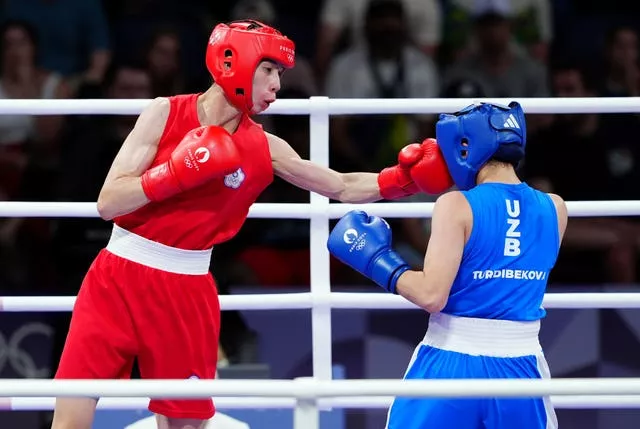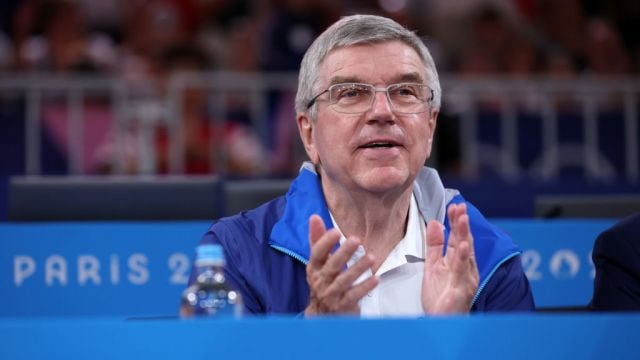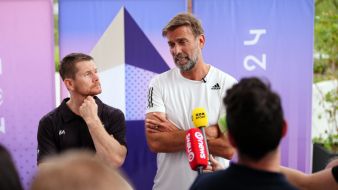International Olympic Committee president Thomas Bach insisted there was “never any doubt” that the two boxers at the centre of a gender row are women.
The participation of Lin Yu-ting and Imane Khelif at Paris 2024 has led to scrutiny after they were disqualified from last year’s World Championships for failing to meet gender eligibility criteria.
On Thursday, Algeria’s Khelif won her bout in just 46 seconds, with opponent Angela Carini saying afterwards that she had “never felt a punch like this.”
Chinese Taipei fighter Lin also won her women’s featherweight (-57kg) fight on Friday with a unanimous decision victory over Uzbekistan’s Sitora Turdibekova.

Both fighters have previously competed in female boxing events for a number of years, but the International Boxing Association (IBA) – which carried out the tests in 2023 – said the duo failed “to meet the eligibility criteria for participating in the women’s competition”.
However, the IBA was stripped as the global governing body for boxing in June last year by the IOC, which is administering the sport in Paris.
In a press conference on Saturday morning, IOC president Bach addressed the criticism surrounding the two boxers and condemned the “hate speech” the pair have received on social media.
“Let’s be very clear, we are talking about women’s boxing,” Bach said.
“We have two boxers who are born as a woman, who have been raised as a woman, who have a passport as a woman and who have competed for many years as a woman.
“This is the clear definition of a woman. There was never any doubt about them being a woman.
IOC President Thomas Bach responds to questions about the women's boxing competition and makes it very clear there was never any doubt on the athletes being women, and that the current online abuse is unacceptable. pic.twitter.com/Xvd6SvtmQ5
Advertisement— IOC MEDIA (@iocmedia) August 3, 2024
“What we see now is that some want to own the definition of who is a woman. There I can only invite them to come up with a scientific-based, new definition of who is a woman and how can somebody being born, raised, competed and having a passport as a woman cannot be considered a woman.
“If they are coming up with something, we are ready to listen, we are ready to look into it, but we will not take part in a sometimes politically-motivated, cultural war.
“Allow me to say that what is going on in this context in social media with all this hate speech, with this aggression and abuse fuelled by this agenda is totally unacceptable.”
Carini apologised for her reaction post-fight and told Italian newspaper Gazzetta dello Sport: “All this controversy makes me sad. I’m sorry for my opponent, too. If the IOC said she can fight, I respect that decision.”
Bach also stressed that the controversy is “not a transgender issue”.

“We are not talking about a transgender issue here, this is about a woman taking part in a women’s category,” he said.
“The IOC framework, which is scientifically based, applies to all federations. This is about a woman taking part in a woman’s competition.
“I would only like to ask each and everybody to respect these women, respect them as women and respect them as human beings.”
Khelif is in action on Saturday, where she faces Hungary’s Anna Luca Hamori in the women’s 66kg quarter-finals.
On Friday night the Hungarian Boxing Association questioned the decision to allow the Algerian to compete and called for clarification about her participation.

Lajos Berko, a member of the Hungarian Boxing Association’s executive board, said in a statement: “On August 3, Luca will face Algeria’s Imane Khelif for a guaranteed medal semi-final. In recent hours, our federation has notified the Hungarian Olympic Committee that we object to the participation of the Algerian athlete.
“We would like to express our gratitude to the Hungarian Olympic Committee. It continuously examines what means it can use to protect Luca Hamori’s rights to fair competition based on the rules in force.
“The (Hungarian Olympic Committee) president immediately initiated consultations with the IOC sports director in order to clarify the situation.”
Carini apology
In an interview with Italian daily Gazetta dello Sport published on Friday, Carini said she did not mean to stir up such heated controversy.
“All this controversy certainly made me sad, and I also felt sorry for my opponent, she had nothing to do with it and like me was only here to fight,” she said.
“It was not intentional, in fact I apologise to her and to everyone. I was angry, because my Games had already gone up in smoke. I have nothing against Khelif and on the contrary if I happened to meet her again I would give her a hug.”
The IOC said the IBA decision to disqualify the boxers last year was arbitrary and the main cause for the furore that has seen people such as British author J. K. Rowling and billionaire Elon Musk voice their opposition to them competing in the Games.
Italian prime minister Georgia Meloni, who met IOC president Thomas Bach on Thursday, said the Italian athlete had faced a boxer who had physical advantages and it was not a fight between equals.
However, WBC women's world featherweight champion Skye Nicolson pointed out that Khelif and Lin had both been beaten by women several times during their careers, including by Irish boxers Kellie Harrington and Amy Broadhurst, and said they "do not deserve this mistreatment".
"I've actually fought and sparred both of the girls," the Australian said in an Instagram post.
"They have grown up as girls, as females, as women. They have competed as women the whole time. These are not naturally born men who have decided to call themselves women or identify as women to fight women in the Olympics.
"I feel like the thing that happened with the Italian girl was a publicity stunt more than anything."







